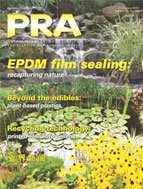 |
 |
In this Edition August 2011 |
LEAD FEATURE |
COMPANY NEWS |
MATERIALS NEWS |
MACHINERY NEWS |
INJECTION MOULDING ASIA |
PRA August 2011 Electronic Issue Now Available |
Materials News
Degradable plastic bag misunderstood?
W
hen a large retailer with a global chain of supermarkets decides to stop using degradable plastic bags, it certainly demands attention! UK-based Tesco has announced that research has revealed that "eco-friendly" carrier bags may be more environmentally damaging than conventional plastic bags. This has not gone down well with bioadditives producers Symphony Environmental Technologies and EPI Environmental Products.UK-based Symphony said that it could not understand why Tesco had moved away from degradable plastic carrier bags because the bags were weak. Symphony's spokesman said, "These bags were made with additive supplied by one of our competitors, and they were weak because they were not suitably made. This has nothing to do with degradability. We are supplying bags made with our d2w degradable technology to supermarkets all over the world and we do not get complaints that they are unfit for purpose. We offered to make the bags for Tesco but there was no response."
The spokesperson went on to say that recyclability had anything to do with it. "Our d2w bags can be made with recyclate, and can themselves be recycled together with normal plastics during their useful life which, in the case of a shopping bag is normally 18 months."
Meanwhile, Canada-based EPI Environmental Products, which supplied the additive used by Tesco in its oxo-biodegradable plastic (OBP) bags, has said, "The weakness of the Tesco bags was most certainly not a result of using OBP additives. EPI supplied additives for Tesco bags for several years and is aware that problems with weak bags were not observed until Tesco implemented cost-cutting measures such as film thickness reduction and increase in fillers and recycled content. EPI's OBP additives are used worldwide in carrier bags without any problems related to weakening of bags."
EPI also added that Tesco's decision to stop using the OBP additive was made after the release of the UK DEFRA report on OBP, which raised questions about OBP performance and appears to have influenced Tesco's key decision makers. It adds, "Unfortunately, the DEFRA report was actually an incomplete literature review of OBP technology, and the erroneous conclusions drawn regarding OBP degradation and biodegradation were based on misconceptions."
Last year, Tesco handed out more then two billion oxo biodegradable bags to customers. According to the European Plastics Recyclers Association, an oxo biodegradable bag is unlikely to degrade in a landfill because of the absence of light and oxygen.
Early this year, Tesco introduced new plastic bags that are not biodegradable but instead contain 15% recycled material, in comparison to rival supermarket chain Sainsbury's bags that contain 50% recycled material. Tesco says it made the decision to remove the oxo additive because it believed that the additive contributed towards its bags becoming weaker.

